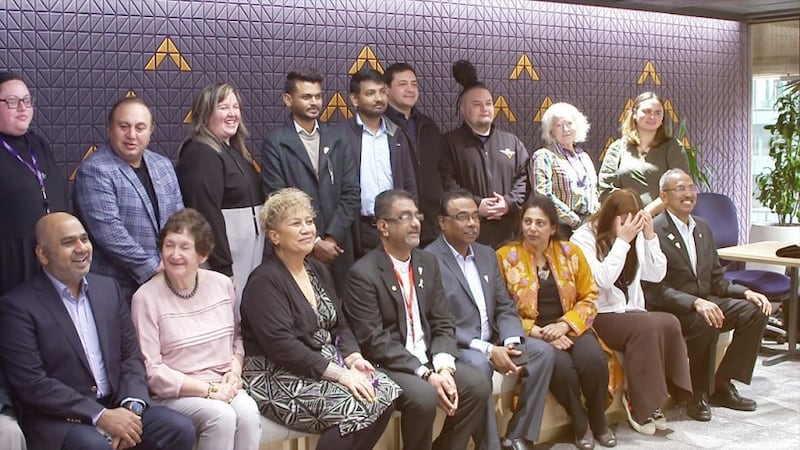The Māori Language Commission is teaming up with the Tamil Community in Wellington for a pilot project to teach te reo Māori to the members of the community.
Tamil community leaders hope their children can grow up in an Aotearoa where te reo Māori is spoken by everyone and the language commission is looking to extend classes like these into more communities.
Members of the Aotearoa NZ Federation of Tamil Societies have been welcomed to the Te Taura Whiri i te reo Māori office to celebrate their newly formed relationship.
The Tamil community had approached Te Taura Whiri, the Māori Language Commission, to start te reo Māori classes for the children in their community. Te Taura Whiri responded and in a first of its kind, community-led te reo Māori classes will now be open to members of the community at Newlands in Wellington.
Community leaders say there is a lot of enthusiasm among tauiwi for te reo Māori and this initiative is a manifestation of that desire to learn.
More classes needed
Raveen Annamalai, the President of Aotearoa Federation of Tamil Sangams believes Aotearoa should move beyond one language.
"To me, it (te reo Māori) should be the first language of the nation."
Although it is not a compulsory subject in schools, he believes there needs to be more access to classes.
"Community organisations need to work with local iwi, mana whenua and tangata whenua and see how we can collaborate, so that my mokopuna and my children can understand te reo Māori," he says.
Te Taura Whiri says community organisations taking the initiative is a welcome move. "Me whai akoranga te tauiwi ki te reo Māori," says Kiriana Eparaima-Hautapu, Kaitohotohu Matihiko at Te Taurawhiri i Te Reo Māori. "Mā te mōhio i te reo Māori, ka mōhio koe tō tātou nei whēnua"
(Tauiwi should look to learn te reo Māori. When you learn the reo, you get to know the land.)
Te reo journey
Sharee Adam (Ngāti Koroki Kahukura) will be teaching these classes, which are scheduled to start in October. "Āe, me ako te tauiwi i tō tātou reo," she says. "Kia whai māramatanga ki tō tātou hitori, ki to tātou kōrero o nehe rā hoki."
(Yes, tauiwi should learn our language, to better understand our history and the historical context of things.)
"When you call this your home, it is your responsibility to understand, value and embrace te reo Māori," Annamalai says.
Diversity, Inclusion and Ethnic Communities Minister Priyanca Radhakrishnan is on a reo journey herself and credits her MP colleagues for helping her learn.
"Many of us are from countries that have been colonised and we have a collective response to recognise tangata whenua and we have a collective role to protect and preserve te reo Māori," she says.
Using kupu Māori every day
And tauiwi across the country are taking up the challenge. Prayash Chettri, originally from Nepal, is enrolled at Te Wānaga o Raukawa and has been on a reo journey for over two years.
"E ako ana ahau i te reo Māori kia whakawhanaunga, kia whai māramatanga ki te ahurea me ngā kaupapa Māori," he says. (I am learning te reo Māori to form relationships and to better understand the culture and kaupapa Māori.)
Karim Dhanani, a Massey University student, who is working for Auckland Libraries, says it is important to incorporate kupu Māori in everyday life. He is not enrolled in a course but is taking it upon himself to learn and use the reo.
"When I go out for a coffee, I ask for a kawhe. And people have started acknowledging what I am saying. And at home, I have labelled all my things in te reo Māori."
First of many?
But it is vital to understand aspects of te ao Māori other than just the language, says Ayolabi Martins, who is originally from Nigeria and, like Dhanani, is teaching himself te reo Māori.
"Just learning te reo can sometimes put you in a place where you are using it tokenistically."
Back in Wellington, classes run by the Aotearoa Federation of Tamil Sangams are scheduled to start in October. Te Taura Whiri hopes this is the first of many. "Ko tō mātou whainga ka whakawhānui tēnei kaupapa ki tauiwi kē. Kia tino rongo Aotearoa whānui i te ataahua o te reo rangatira," says Eparaima-Hautapu.
(We hope that this kaupapa expands into other migrant communities, and that the beauty of this reo is felt across Aotearoa.)

